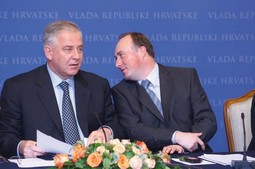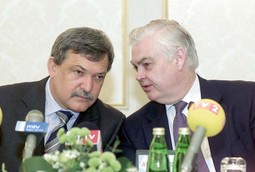Published in Nacional number 749, 2010-03-23
Croatia ready to scrap contract with MOL
If the State Attorney's Office establishes that the shareholder's agreement between INA and MOL is illegal and detrimental to Croatia, it will suggest the agreement be scrapped, which some independent institutions are suggesting Government should do
 BAJIC INVESTIGATING THE LEGALITY OF THE DEAL Chief State Attorney Mladen Bajic will be forced to launch a legal procedure to cancel the INA management rights contract if the State Attorney's Office deems it to have been concluded in illegal circumstancesThe State Attorney's Office of Croatia is seriously considering the possibility that the shareholder's agreement on the management of Croatian oil company INA, concluded between Croatian Government and Hungary's MOL, is detrimental to Croatia's national interests. If the State Attorney's Office establishes this in its investigation, i.e. finds on the basis of the information it has collected that the contract was concluded in illegal circumstances and to Croatia's detriment, Chief State Attorney Mladen Bajic will be forced by law to launch the legal procedure to cancel the contract.
BAJIC INVESTIGATING THE LEGALITY OF THE DEAL Chief State Attorney Mladen Bajic will be forced to launch a legal procedure to cancel the INA management rights contract if the State Attorney's Office deems it to have been concluded in illegal circumstancesThe State Attorney's Office of Croatia is seriously considering the possibility that the shareholder's agreement on the management of Croatian oil company INA, concluded between Croatian Government and Hungary's MOL, is detrimental to Croatia's national interests. If the State Attorney's Office establishes this in its investigation, i.e. finds on the basis of the information it has collected that the contract was concluded in illegal circumstances and to Croatia's detriment, Chief State Attorney Mladen Bajic will be forced by law to launch the legal procedure to cancel the contract.
The information that the State Attorney's Office is investigating the legality of the contract between Government and MOL has been confirmed for Nacional from several informed sources within INA, and from state institutions such as the Croatian Competition Agency, where the State Attorney's Office has carried out an intensive investigation over recent weeks and collected a significant quantity of documentation. And, based on unconfirmed information, investigators have questioned several high-ranking officials in Croatian Government, including Finance Minister Ivan Suker, who were asked to testify about the circumstances and events of late 2008 and early 2009 when the deal with MOL was hammered out and concluded.
Judging from this information the chief focus of the investigation is directed at former Deputy Prime Minister Damir Polancec, who was practically on his own in leading the negotiations on the new shareholder's agreement with MOL. It appears that the feeling at the State Attorney's Office is that it was Polancec's activities in fact that are key to shedding light on all of the events in the negotiations that resulted in a contract based on which MOL, with 47 percent of the company's stock, holds almost absolute management rights, while the rights of Croatian Government, which still holds 44 percent of the company, have been exceedingly reduced, and the background to the loan that the OTP bank, one of the chief shareholders in MOL, issued to the Koprivnica-based Podravka company at the same time.
To date Polancec has claimed that he knew nothing of the business relations between Podravka and MOL, and that he in no way participated in the business communications between these two companies, but it appears that these claims have been refuted by the testimony of an unknown person from MOL. Based on this testimony Polancec in late 2008, at the height of the negotiations between Government and MOL, personally asked the top people at the company to share with Podravka "their experience in defending the company from the threat of an unfriendly takeover." MOL had at the time successfully wrapped up an almost year-long battle to thwart a takeover attempt by Austria's OMV, and the top people at the company agreed to help out the Podravka leadership in an advisory role.
These claims do not incriminate Polancec directly, but they are very embarrassing for him, because they confirm that he was in fact the person that had set up contacts between the top people at Podravka and MOL. In the end this communication resulted in a 34 million euro loan that the OTP bank paid out to the Fima AMI company, with guarantees from Podravka, and that these funds, as they suspect at the State Attorney's Office, were used to cover up the unsuccessful and illegal attempt to take over the Koprivnica-based company using its own money.
Considering that the loan with the OTP bank was signed by then head of Zdravko Sestak, also a close personal friend of Polancec, all of the connections to the former Deputy Prime Minister had up to now been entirely speculative, but the situation has now changed.
If it is established, namely, that Polancec took part in the initial communication between Podravka and MOL, he will find it much harder to defend himself of accusations that he knew nothing of what transpired later in the relationship, i.e. that he had not participated in working out a deal concerning the cited loan arrangement, especially pertaining to the circumstances in which it was concluded.
Last week, namely, the head of the OTP bank and a member of the MOL supervisory board, Sandor Csany, organised a reception in Budapest for Croatian journalists at which he stated that the loan to Podravka was issued in entirely customary banking procedure, that it was in no way related to the relations between Croatian Government and MOL, and that the oil company had not participated in it.
Nacional's banking sources claim that it is almost unbelievable that a commercial bank would agree to issue a loan of that size to a company of that type without any additional outside guarantees or co-debtors, especially in the circumstances present in the second half of 2008 when Europe, and Hungary in particular, had been hit hard by the global economic recession. As a result the more likely possibility is that the loan was issued to Fima, i.e. Podravka, in the frame of a much broader arrangement.
 FORMER PRIME MINISTER Ivo Sanader with former Deputy Prime Minister Damir Polancec, who was practically on his own in leading the negotiations on a new shareholder's deal with MOLIf the investigation shows that the arrangement was linked to the negotiations between Government and MOL, i.e. that Polancec, who was representing Croatia, had participated in it in any way, the conditions will have been met for the State Attorney's Office to seek an abrogation of the contact. On the other hand investigators are also looking into leads that there may have been illegalities going on within Croatian national institutions. Five members of the Government commission that was to have led the process of negotiation on the shareholder's agreement with MOL have allegedly been questioned. Its members, besides then Deputy Prime Minister Damir Polancec, were Finance Minister Ivan Suker, his assistant at the time and now the head of the Croatian Privatisation Fund Vedran Duvnjak, State Secretary for the e-Croatia programme Igor Lucic, and the State secretary at the Justice Ministry Drazen Bosnjakovic.
FORMER PRIME MINISTER Ivo Sanader with former Deputy Prime Minister Damir Polancec, who was practically on his own in leading the negotiations on a new shareholder's deal with MOLIf the investigation shows that the arrangement was linked to the negotiations between Government and MOL, i.e. that Polancec, who was representing Croatia, had participated in it in any way, the conditions will have been met for the State Attorney's Office to seek an abrogation of the contact. On the other hand investigators are also looking into leads that there may have been illegalities going on within Croatian national institutions. Five members of the Government commission that was to have led the process of negotiation on the shareholder's agreement with MOL have allegedly been questioned. Its members, besides then Deputy Prime Minister Damir Polancec, were Finance Minister Ivan Suker, his assistant at the time and now the head of the Croatian Privatisation Fund Vedran Duvnjak, State Secretary for the e-Croatia programme Igor Lucic, and the State secretary at the Justice Ministry Drazen Bosnjakovic.
But, as Nacional learned a month ago, while it was formally not disbanded, the commission stopped working under mysterious circumstances just a month after it had been set up. The members of the commission stopped meeting, they no longer received information on the course of the negotiations, and all decisions were made autonomously by Polancec, even though he had no formal mandate to do so. What is more, Polancec continued to lead the entire negotiation process with the Hungarians entirely on his own, without any control or supervision by official state institutions. USKOK (Bureau for the Prevention of Corruption and Organized Crime) investigators now want to know how and why that happened, and whether this was a direct violation of a decision made by Government. It is assumed that these circumstances were in fact the subject of the questioning of members of the commission, and of Minister Suker.
The State Attorney's Office is also investigating information concerning how the head of the Croatian Competition Agency, Olgica Spevec, under strong political pressure from Polancec and former Prime Minister Ivo Sanader, abandoned her intention of making the MOL takeover of a controlling package of INA conditional on its sale of the lucrative Tifon chain of petrol filling stations, that is to say why she had been forced to remove the, for Government, very embarrassing conclusion from the final version of her report that the new contract was giving MOL management rights disproportionately extensive in proportion to its stake in the ownership.
Nevertheless, in spite of numerous indications of illegal activity in the process of the privatisation of the national oil company, it appears that at this moment the State Attorney's Office still does not have concrete material evidence or testimony that would undeniably substantiate these leads. If he did, namely, have such indications Chief State Attorney Mladen Bajic would, given the role the law gives him as the legal representative of the Republic of Croatia, be forced to initiate court action to rescind the contract.
Bajic has not yet done so, but even in the event that the necessary evidence was collected, legal experts that Nacional has consulted feel that it is hard to believe that the contract with MOL would in fact in the end be scrapped. It could, namely, be expected that the leadership of the Hungarian company would, in that event, set into motion all available mechanisms to protect their interests, from legal and political right up to informal pressure on Croatian Government. Given, namely, that Hungary is a member of the European Union, and that Croatia is still not, it can be assumed that Croatia would be faced with the strong opposition of official European institutions. And, according to some legal interpretations, even if the State Attorney's Office established beyond a doubt the criminal negligence of Polancec or Sanader, i.e. that it was confirmed by a res judicata court verdict, it is an open question as to whether that would suffice to quash the contract. Regardless, namely, of what Polancec had been doing in the negotiations, the contract itself was formally adopted by a decision of all members of Government. And while it is clear that the authority wielded by Ivo Sanader largely imposed the decision, in the legally formal sense it would be very hard to rescind it.
On the other hand, it is also an open question to what extent cancelling the contract with MOL would even at this point in time be in line with Croatian national interests. MOL, namely, gained its ownership stake in INA in a quite legal fashion, and that cannot be challenged. Launching a lawsuit would almost certainly result in MOL putting a halt on any investment activity in INA, and without the required fresh capital needed to consolidate its operations and for modernisation, INA could soon be faced with serious problems. In that situation it could be assumed that the company would once again have problems settling its debts towards the state.
 SANDOR CSANY (left), the head of the Hungarian OTP bank and a member of the supervisory board of MOL, said at a press conference last week that the loan to Podravka had been issued in entirely customary banking procedureThe entire problem could be further complicated if media reports that INA will issue bonds to the market with a maturity date of two years which, if the company is unable to pay off the debt would be converted into shares, proves true. MOL would thereby have the opportunity of buying up a significant portion of these bonds via friendly funds or offshore companies and two years down the road gain majority ownership of INA. As a result some legal experts feel that the entire dispute will end with a settlement between Government and MOL, i.e. an agreement to amend the shareholder's contract on the basis of which Croatia would, at least for the time being, gain greater control of the company's operations. On the other hand, it is presumed that the top people at MOL would be inclined towards a deal of this kind if it would mark the definite end of, what is for them, a very embarrassing scandal.
SANDOR CSANY (left), the head of the Hungarian OTP bank and a member of the supervisory board of MOL, said at a press conference last week that the loan to Podravka had been issued in entirely customary banking procedureThe entire problem could be further complicated if media reports that INA will issue bonds to the market with a maturity date of two years which, if the company is unable to pay off the debt would be converted into shares, proves true. MOL would thereby have the opportunity of buying up a significant portion of these bonds via friendly funds or offshore companies and two years down the road gain majority ownership of INA. As a result some legal experts feel that the entire dispute will end with a settlement between Government and MOL, i.e. an agreement to amend the shareholder's contract on the basis of which Croatia would, at least for the time being, gain greater control of the company's operations. On the other hand, it is presumed that the top people at MOL would be inclined towards a deal of this kind if it would mark the definite end of, what is for them, a very embarrassing scandal.
Related articles
'A profitable INA is in everyone's interest'
The growing number of calls for a possible revision of the key contracts outlining relations between Croatian Government and Hungarian-based MOL will… Više
Latest news
-
28.10.2010. / 14:15
'A profitable INA is in everyone's interest'
-
28.10.2010. / 09:38
Sanader’s eight fear SDP — Won’t bring down Government
-
21.10.2010. / 15:02
Interior Ministry turned a blind eye on Pukanic assassination
-
20.10.2010. / 09:34
Barisic could bankrupt HDZ




